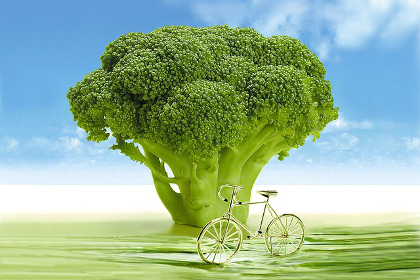
Broccoli May Slow Age-Related Decline and Promote Longevity by Reducing Chronic Health Risks
Certain plant compounds also have potent anti-aging effects. Broccoli, for example, which is probably best known for its anti-cancer activity, also contains an enzyme researchers believe may slow age-related decline in health by restoring your metabolism to more youthful levels.
November 14, 2016 | Source: Mercola.com | by Dr. Joseph Mercola
Eating plenty of fresh vegetables (ideally organic to avoid pesticides) is a foundational aspect of a healthy diet, and can help lower your risk for many chronic diseases, including type 2 diabetes,1 heart disease, stroke and certain cancers.
Besides being rich in vitamins, minerals and fiber, vegetables also contain antioxidants and disease-fighting compounds you won’t find in other foods, especially not processed foods.
Some phytochemicals (plant chemicals) help reduce inflammation and eliminate carcinogens, while others regulate cell reproduction, apoptosis (programmed cell death) and DNA maintenance.
Certain plant compounds also have potent anti-aging effects. Broccoli, for example, which is probably best known for its anti-cancer activity, also contains an enzyme researchers believe may slow age-related decline in health by restoring your metabolism to more youthful levels.2,3,4
One basic premise of aging is that, as you age, your cells’ ability to produce energy declines. With less available energy, cell repair and maintenance declines as well and, with that, degeneration sets in.
Broccoli Enzyme May Slow Aging
The enzyme in question is called nicotinamide mononucleotide (NMN), which plays a role in producing nicotinamide adenine dinucleotide (NAD), a compound involved in mitochondrial health and energy metabolism.
Previous research has shown that, with age, your body loses its capacity to create NAD — an effect thought to be related to, or the result of, chronic inflammation. Studies have shown that taking NAD directly is ineffective, however, which is what led the researchers to look for a precursor.
Indeed, they found that when NMN is dissolved and administered in water, it takes just three minutes for the compound to appear in the blood. Once there, the NMN is quickly converted into NAD in multiple tissues. As reported by Time magazine:5
“When they gave normal aging mice infusions of NMN, they made more of that energy-fueling compound and some of the biological problems associated with aging went away.
The NMN-treated animals did not gain as much weight, they were able to convert food into energy more efficiently, their blood sugar was better — even their eyesight improved.
The mice receiving NMN were also able to prevent some of the genetic changes associated with aging.”
Eat Your Greens If You Want Health and Longevity
The results were encouraging enough that the researchers are now planning further studies in humans, using NMN supplements. As explained by senior author Dr. Shin-Ichiro Imai, professor of developmental biology and medicine at Washington University:6
“We are losing the enzyme NMN. But if we can bypass that process by adding NMN, we can make energy again. These results provide a very important foundation for the human studies.”
Besides broccoli, NMN is also found in cucumbers, cabbage, avocado and other green vegetables. While it remains to be seen whether all of these effects hold true in humans, it certainly wouldn’t hurt to add more greens to your diet. Overall, studies have shown that people with higher vegetable intake have:
Lower risks of high blood pressure and stroke
Lower risks of certain types of cancer
Reduced risk of kidney stones and bone loss
Higher scores on cognitive tests
Higher antioxidant levels
Lower biomarkers for oxidative stress
Lower risk for Alzheimer’s disease7
Lower risk for eye diseases
Fewer digestive problems
